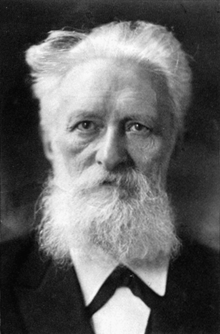Rudolf Christoph Eucken
Rudolf Christoph Eucken | |
|---|---|
 | |
| Kelahiran | (1846-01-05)5 Januari 1846 Aurich, Kerajaan Hanover, Jerman |
| Meninggal dunia | 15 September 1926(1926-09-15) (umur 80) Jena, Thuringia, Jerman |
| Pusat pendidikan | Universiti Göttingen Universiti Berlin |
| Anugerah | Hadiah Nobel dalam Kesusasteraan (1908) |
| Era | Falsafah abad ke-19/ke-20 |
| Falsafah | Falsafah Barat |
| Sekolah | Falsafah Jerman Idealisme Jerman |
| Institusi | Universiti Jena Universiti Basel |
Kepentingan utama | Etika |
Idea cemerlang | Aktivismus (aktivisme etika)[1] The Real |
Dipengaruhi
| |
Mempengaruhi | |
| Tandatangan | |
 | |
Rudolf Christoph Eucken (bahasa Jerman: [ˈɔʏkn̩]; 5 Januari 1846 – 15 September 1926) ialah seorang ahli falsafah Jerman. Beliau menerima Hadiah Nobel dalam Kesusasteraan 1908 sebagai "pengiktirafan untuk mencari kebenarannya yang sungguh-sungguh, kuasa pemikirannya yang menembusi, pelbagai wawasannya, dan kehangatan dan kekuatan dalam persembahan dengan mana dalam banyak karya beliau telah membuktikan dan membangunkan idealisistik falsafah kehidupan", selepas beliau telah dicalonkan oleh ahli Akademi Sweden.[3]
Karya utama
- Die Lebensanschauungen der großen Denker (1890; 7th ed., 1907; 1918; Eng. trans., W. Hough and Boyce Gibson, The Problem of Human Life, 1909) (The Problem of Human Life as Viewed by the Great Thinkers)
- Der Kampf um einen geistigen Lebensinhalt (1896) (The Struggle for a Spiritual Content of Life)
- Der Wahrheitsgehalt der Religion (1901) (The Truth of Religion)
- Grundlinien einer neuen Lebensanschauung (1907) (Life's Basis and Life's Ideal: The Fundamentals of a New Philosophy of Life)
- Der Sinn und Wert des Lebens (1908) (The Meaning and Value of Life)
- Geistige Strömungen der Gegenwart (1908; first appeared in 1878 as Die Grundbegriffe der Gegenwart; Eng. trans. by M. Stuart Phelps, New York, 1880) (Main Currents of Modern Thought)
- Können wir noch Christen sein? (1911) (Can We Still Be Christians?, 1914))
- Present Day Ethics in their Relation to the Spiritual Life (1913) (Deem Lectures given at New York University)
- Der Sozialismus und seine Lebensgestaltung (1920) (Socialism: an Analysis (1922))
Other notable works are:
- Die Methode der aristotelischen Forschung (1872) (The Aristotelian Method of Research)
- Geschichte der philosophische Terminologie (1879) (History of Philosophical Terminology)
- Prolegomena zu Forschungen über die Einheit des Geisteslebens (1885) (Prolegomena to Research on the Unity of the Spiritual Life)
- Beiträge zur Geschichte der neueren Philosophie (1886, 1905) (Contributions to the History of the Newer Philosophies)
- Die Einheit des Geisteslebens (1888) (The Unity of the Spiritual Life)
- Thomas von Aquino und Kant (1901) (Thomas Aquinas and Kant)
- Gesammelte Aufsätze zu Philosophische und Lebensanschauung (1903) (Collected Essays on Views of Philosophy and Life)
- Philosophie der Geschichte (1907) (Philosophy of History)
- Einführung in die Philosophie der Geisteslebens (1908; Eng. trans., The Life of the Spirit, F. L. Pogson, 1909, Crown Theological Library) (Introduction to the Philosophy of the Life of the Spirit)
- Hauptprobleme der Religionsphilosophie der Gegenwart (1907) (Main Problems of the Current Philosophy of Religion)
Other English translations of his work include:
- Liberty in Teaching in the German Universities (1897)
- Are the Germans still a Nation of Thinkers? (1898)
- Progress of Philosophy in the 19th Century (1899)
- The Finnish Question (1899)
- The Present Status of Religion in Germany (1901)
- The Problem of Human Life as Viewed by the Great Thinkers from Plato to the Present Time, Charles Scribner's Sons, 1909.
- Back to Religion, 1912.
- Main Currents of Modern Thought: A Study of the Spiritual and Intellectual Movements of the Present Day, T. Fisher Unwin, 1912.
- The Meaning and Value of Life, A. and C. Black, 1913.
- Can we Still be Christians?, The Macmillan Company, 1914.
- Collected Essays, T. Fisher Unwin, 1914.
- Knowledge and Life (translation), G.P. Putnam's Sons, 1914.
Rujukan
Bacaan lanjut
- Beck, Friedrich Alfred. Rudolf Eucken, Deutsche Buch-Gemeinschaft, 1927.
- Booth, Meyrick. Rudolf Eucken: His Philosophy and Influence, Charles Scribner's Sons, 1913.
- Feuling, Daniel. "Rudolf Eucken's Philosophy," The Dublin Review, Vol. CLV, July/October, 1914.
- Gibson, W. R. Boyce. Rudolf Eucken's Philosophy of Life, A. & C. Black, 1915.
- Jones, Abel J. Rudolf Eucken: A Philosophy of Life, T. C. & E. C. Jack, 1913.
- Jones, W. Tudor. Rudolf Eucken: His Life and Philosophy, Haldeman-Julius Co., 1920.
- MacSwiney, Margaret Mary. Rudolf Eucken and the Spiritual Life, National Capital Press, 1915.
Pautan luar
 Kategori berkenaan Rudolf Christoph Eucken di Wikimedia Commons
Kategori berkenaan Rudolf Christoph Eucken di Wikimedia Commons- Eucken, Rudolf Christoph at Nobel-winners.com







